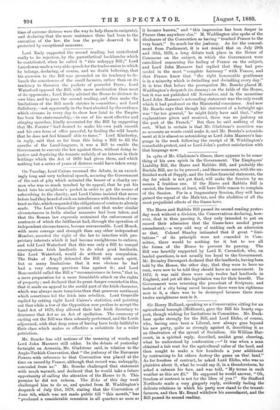On Tuesday, Lord Cairns resumed the debate, in an exceed-
ingly long and very technical speech, accusing the Government of the sort of pity which actuated the hearer of a charity ser- mon who was so much touched by its appeal, that he put his hand into his neighbour's pocket in order to get the means of subscribing to the charity, and Lord Cairns insisted that never before had they heard of such an interference with freedom of con- tract as this, which suspended the obligations of contracts already made. The Lord Chancellor pointed out that under similar circumstances in India similar measures had been taken, and that the Roman law expressly restrained the enforcement of contracts of which the fulfilment had, through the operation of independent circumstances, become unreasonable. Lord Monck, with more courage and strength than any other independent Member, asserted the right of the law to interfere with pro- prietary interests which it had become unrighteous to enforce, and told Lord Waterford that this was only a Bill to compel unscrupulous Irish landlords to do what good landlords, like Lord Waterford, would do without any compulsion. The Duke of Argyll defended the Bill with much spirit, but so many limitations that it was obvious he had had a very strong previous bias against it; and Lord Beaconsfield called the Bill a "reconnaissance in force," that is, a mere preparation for a more formidable attack on the rights of property ; and declared that its great danger consisted in this, that it made an appeal to the sordid part of the Irish character, which was always more tenacious than that generous sentiment which sometimes led the Irish into rebellion. Lord Granville replied by setting right Lord Cairns's statistics, and pointing out that while a few of the Opposition now profess to accept the Land Act of 1870, they allowed their late Irish Secretary to denounce that Act as an Act of spoliation. The ceremony of casting out the Bill was then solemnly performed, and the Lords adjourned, with that deep sense of having been truly faithful to their class which makes so effective a substitute for a wider patriotism.


































 Previous page
Previous page